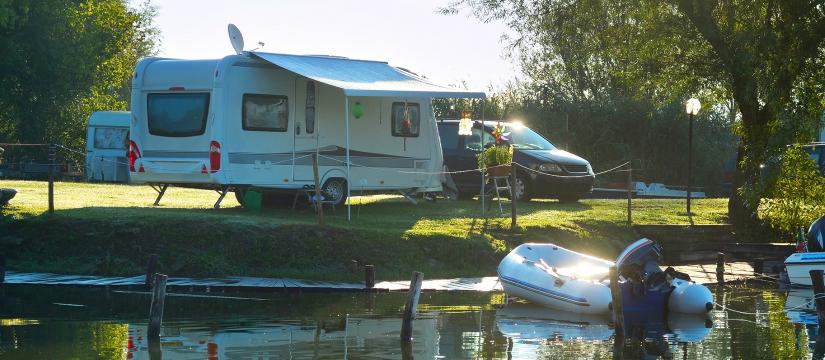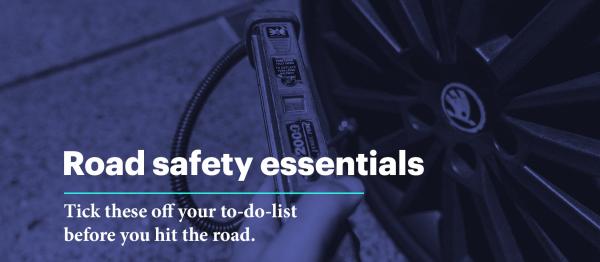This article was originally published in November 2022 and has been updated.
Share this story:
Got plans to hit the road and explore our vast and varied country? Get a steer on the pros and cons caravans, campers and motorhomes to help you work out the best option for your big adventure.
There are a lot of caravans in the market. In fact, there’s a whopping 200 brands competing for your attention – so we understand why choosing the right one can feel a little daunting! But here’s the good news. With that many options, you’re bound to find one that suits your family and price point. It’s just a matter of doing your homework – and we can help with that!
Ideal for: Families and couples who want flexibility and freedom.
First up, the classic caravan. It’s the quintessential, 4-walled beauty on wheels you’ll see in most movies or ads. It’s towed by a vehicle (different from a campervan) and is pretty self-contained. With a full-height roof, amenities can differ depending on the size and price, but generally include a bed, kitchen, shower and toilet.
Like the name implies, these caravans pop up for extra head room. They generally include all the comforts of a usual caravan but are lighter and have less wind-resistance when being towed. The ability to lower the height also allows for easier storage in a garage or carport.
Instead of adding more height, these add more space to the sides. Similar to the pop up, these caravans have a slimmer profile allowing for easier towing and storage.
Ideal for: Families who enjoy getting back to nature.
Imagine if your caravan could fold itself neatly into a compact trailer. Boom! That’s a camper trailer. Essentially, you get the best of both worlds; all the space you need when you’re set up, but you can pack it all down when it’s time to go.
In the most basic camper trailers, you essentially have a canvas tent that folds in and out of a box trailer. These are called soft-floor campers, because the tent section folds out into the ground. The other end of the spectrum is the hard-floor camper, and they’re a bit more expensive. In these, the lid of the trailer folds out to become a hard floor, with some offering spacious living areas and fold out beds. These can even have a cook top for making meals.
Camper trailers are a great option for families that want the basic comforts of a caravan and also want the manoeuvrability of something smaller to head on more rugged adventures. Taking only a few minutes to set up, camper trailers are as close as you can get to a caravan without the hefty price tag and towing bulk.
Ideal for: Couples or singles who love road trips along scenic winding roads.
Unlike a caravan, which needs to be towed by another vehicle, campervans are self-contained vehicles with an engine. They’re generally smaller than caravans and motorhomes, but offer the all-in-one convenience of a vehicle you can both drive and live in. You also have the benefit of easy parking and can use the van for day-to-day use.
Given their compact size, campervans are well suited to singles and couples, rather than larger families. They may not be as large and luxurious as a motorhome, but many are still equipped with the necessities you’d need for a few nights on the road, like a couple of small burners for cooking, a sink, toilet and shower, and space for sleeping. It’s just a little more cosy!
Ideal for: Families who prioritise comfort and space on their adventure.
If you’re after luxury on wheels, this is probably your best bet — but be aware, you may compromise some of the benefits that drew you to mobile accommodation in the first place.
Let’s start with the positives. Motorhomes are essentially a home away from home. They’re equipped with all the creature comforts you’d expect to find; comfy sleeping quarters, bathroom facilities, a fully functional kitchen, and a TV. They’re set up to be self-sufficient, and once you’ve reversed into the campsite, you’re good to go.
But here’s the catch. Being the large size they are, they can be difficult to manoeuvre, store and they’re not really suited to narrow roads. Finding a car park might also take a little more planning. So if you’re more of a ‘road-less-travelled' type, it may not be as well suited to you.
The bigger you go, the more comfort you have, but the smaller you go, the more manoeuvrability and flexibility. Ultimately, you’ll need to consider the style of travel you’re after, how long you intend to travel for, and whether or not you prioritise comfort over space.
All content on the NRMA Insurance Blog is intended to be general in nature and does not constitute and is not intended to be professional advice.


